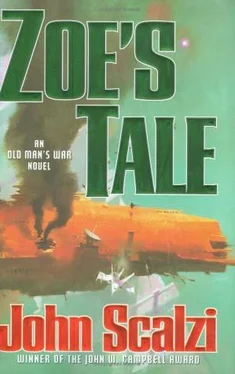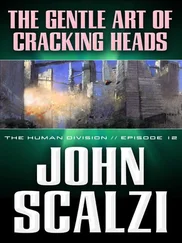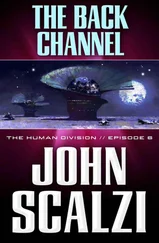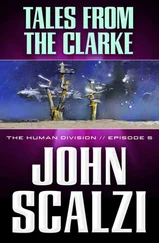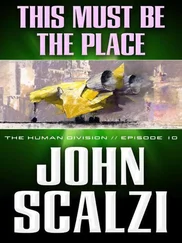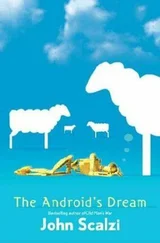And then we opened the inner door and found a geek inside. He looked at the both of us, a little surprised, and then got that no look.
"The answer is no," he said, confirming the look.
"Aw, Mr. Bennett," I said. "You don't even know what we're going to ask."
"Well, let's see," said Jerry Bennett. "Two teenage girls—daughters of the colony leaders, incidentally—just happen to walk into the only place in the colony where one could play with a PDA. Hmmm. Are they here to beg to play with a PDA? Or are they here because they enjoy the company of a chunky, middle-aged man? This is not a hard question, Miss Perry."
"We just want to listen to one song," I said. "We'll be out of your hair in just a minute."
Bennett sighed. "You know, at least a couple times a day someone just like you gets the bright idea to come in here and ask if I could just let them borrow a PDA to watch a movie, or listen to some music or read a book. And, oh, it'll just take a minute. I won't even notice they're there. And if I say yes, then other people will come in asking for the same time. Eventually I'll spend so much time helping people with their PDAs that I won't have time to do the work your parents, Miss Perry, have assigned me to do. So you tell me: What should I do?"
"Get a lock?" said Gretchen.
Bennett glanced over to Gretchen, sourly. "Very amusing," he said.
"What are you doing for my parents?" I asked.
"Your parents are having me slowly and painstakingly locate and print every single Colonial Union administration memo and file, so they can refer to them without having to come in here and bother me," Bennett said. "In one sense I appreciate that, but in a more immediate sense I've been doing it for the last three days and I'm likely to be doing it for another four. And since the printer I have to work with jams on a regular basis, it does actually require someone to pay attention to it. And that's me. So there you have it, Miss Perry: Four years of technical education and twenty years of professional work have allowed me to become a printer monkey at the very ass end of space. Truly, my life's goal has been achieved."
I shrugged. "So let us do it," I said.
"I beg your pardon," Bennett said.
"If all you're doing is making sure the printer doesn't jam, that's something we could do for you," I said. "We'll work for you for a couple of hours, and in exchange you let us use a couple of PDAs while we're here. And then you can do whatever else you need to do."
"Or just go have lunch," Gretchen said. "Surprise your wife."
Bennett was silent for a minute, considering. "Offering to actually help me," he said. "No one's tried that tactic before. Very sneaky."
"We try," I said.
"And it is lunchtime," Bennett said. "And it is just printing."
"It is," I agreed.
"I suppose if you mess things up horribly it won't be too bad for me," Bennett said. "Your parents won't punish me for your incompetence."
"Nepotism working for you," I said.
"Not that there will be a problem," Gretchen said.
"No," I agreed. "We're excellent printer monkeys."
"All right," Bennett said, and reached across his worktable to grab his PDA. "You can use my PDA. You know how to use this?"
I gave him a look.
"Sorry. Okay." He punched up a queue of files on the display. "These are files that need to go through today. The printer is there"—he motioned to the far end of the worktable—"and the paper is in that bin. Feed it into the printer, stack the finished documents next to the printer. If it jams, and it will, several times, just yank out the paper and let it autofeed a new one. It'll automatically reprint the last page it was working on. While you're doing that you can sync up to the Entertainment archive. I downloaded all those files into one place."
"You downloaded everyone's files?" I asked, and felt ever so slightly violated.
"Relax," Bennett said. "Only public files are accessible. As long as you encrypted your private files before you turned in your PDA, like you were told to, your secrets are safe. Now, once you access a music file the speakers will kick on. Don't turn them up too high or you won't be able to hear the printer jam."
"You have speakers already set up?" Gretchen asked.
"Yes, Miss Trujillo," Bennett said. "Believe it or not, even chunky middle-aged men like to listen to music."
"I know that," Gretchen said. "My dad loves his."
"And on that ego-deflating note, I'll be off," Bennett said. "I'll be back in a couple of hours. Please don't destroy the place. And if anyone comes in asking if they can borrow a PDA, tell them the answer is no, and no exceptions." He set off.
"I hope he was being ironic there," I said.
"Don't care," Gretchen said, and grabbed for the PDA. "Give me that."
"Hey," I said, holding it away from her. "First things first." I set up the printer, queued the files, and then accessed "Delhi Morning." The opening strains flowed out of the speakers and I soaked them in. I swear I almost cried.
"It's amazing how badly you remembered this song," Gretchen said, about halfway though.
"Shhhhh," I said. "Here's that part."
She saw the expression on my face and kept quiet until the song was done.
* * *
Two hours is not enough time with a PDA if you haven't had access to one in months. And that's all I'm going to say about that. But it was enough time that both Gretchen and I came out of the information center feeling just like we'd spent hours soaking in a nice hot bath—which, come to think of it, was something that we hadn't done for months either.
"We should keep this to ourselves," Gretchen said.
"Yes," I said. "Don't want people to bug Mr. Bennett."
"No, I just like having something over everyone else," Gretchen said.
"There aren't a lot of people who can carry off petty," I said. "Yet somehow you do."
Gretchen nodded. "Thank you, madam. And now I need to get back home. I promised Dad I'd weed the vegetable garden before it got dark."
"Have fun rooting in the dirt," I said.
"Thanks," Gretchen said. "If you were feeling nice, you could always offer to help me."
"I'm working on my evil," I said.
"Be that way," Gretchen said.
"But let's get together after dinner tonight to practice," I said. "Now that we know how to sing that part."
"Sounds good," Gretchen said. "Or will, hopefully." She waved and headed off toward home. I looked around and decided today would be a good day for a walk.
And it was. The sun was up, the day was bright, particularly after a couple of hours in the light-swallowing information center, and Roanoke was deep into spring—which was really pretty, even if it turned out that all the native blooms smelled like rotten meat dipped in sewer sauce (that description courtesy of Magdy, who could string together a phrase now and then). But after a couple of months, you stop noticing the smell, or at least accept there's nothing you can do about it. When the whole planet smells, you just have to deal with it.
But what really made it a good day for a walk was how much our world has changed in just a couple of months. John and Jane let us all out of Croatoan not too long after Enzo, Gretchen, Magdy and I had our midnight jog, and the colonists had begun to move into the countryside, building homes and farms, helping and learning from the Mennonites who were in charge of our first crops, which were already now growing in the fields. They were genetically engineered to be fast-growing; we'd be having our first harvest in the not too far future. It looked like we were going to survive after all. I walked past these new houses and fields, waving to folks as I went.
Eventually I walked past the last homestead and over a small rise. On the other side of it, nothing but grass and scrub and the forest in a line to the side. This rise was destined to be part of another farm, and more farms and pastures would cut up this little valley even further. It's funny how even just a couple thousand humans could start to change a landscape. But at the moment there was no other person in it but me; it was my private spot, for as long as it lasted. Mine and mine alone. Well, and on a couple of occasions, mine and Enzo's.
Читать дальше
